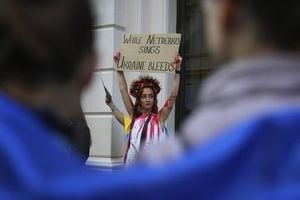President Donald Trump’s administration is reportedly weighing the option of halting New York City’s recently initiated congestion pricing program, which began just three weeks ago on January 5, 2025. This program, which charges most vehicles entering Manhattan’s congestion zone—defined as south of 60th Street—a fee of $9, has already generated significant discussion, as critics argue it could negatively impact local commuters and businesses.
According to The New York Times, the U.S. Department of Transportation is currently deliberation whether to rescind the federal approval granted by the Biden administration last year, effectively challenging the program’s viability and triggering potential legal confrontations between state and federal governments. Trump has consistently criticized congestion pricing since his campaign, proclaiming it as detrimental to both the city’s economy and the wellbeing of its residents.
New Jersey Governor Phil Murphy has been one of the program's fiercest opponents, describing it as “a disaster for working- and middle-class New Jersey commuters and residents” and urging Trump to reconsider the toll initiative.
Despite the criticism, supporters of the congestion pricing initiative, including transportation advocates and the Metropolitan Transportation Authority (MTA), are touting its early successes. The MTA reported reductions of 10% to 30% travel time for vehicles crossing the East and Hudson Rivers, along with over one million fewer vehicles entering the congestion zone since the plan took effect.
Trump has had direct discussions with Governor Kathy Hochul, who has defended the congestion pricing as beneficial for New York City. During the latest conversation on January 30, 2025, Hochul pointed out data indicating improvements in traffic flow and air quality, which she attributes to the new toll system.
While both sides continue their dialogues, Trump's administration has not indicated any immediate plans to take action, choosing instead to evaluate the situation and speak with Hochul again next week. Reports suggest he assured her he would not proceed with any measures against congestion pricing without prior consultation.
The implementation of congestion pricing followed extensive legal battles and delays, including lawsuits filed by opponents, which sought to block its introduction. Nonetheless, the program is positioned to raise significant funds—approximately $1 billion annually—aimed at enhancing public transit infrastructure within the city.
Environmental advocates have rallied around congestion pricing, commending the policy for its potential to lower vehicle emissions and encourage public transit use. According to the MTA, subway ridership has experienced a notable increase of 7.3% this January compared to the previous year, signaling renewed interest among New Yorkers to opt for mass transit.
Nevertheless, skepticism lingers among commuters who argue the toll will not genuinely alleviate traffic congestion but merely shift it to surrounding areas. Mike Lawler, a Republican congressman, echoed these concerns, stating, “Congestion pricing needs to be stopped. Kathy Hochul is charging New York residents $2,500 just for the privilege to commute to work.”
Although the congestion pricing scheme has garnered some supporters, polls indicate more than half of voters statewide oppose it, raising questions about its long-term sustainability and public acceptance.
Trump’s scrutiny of congestion pricing reflects broader sentiments among many suburban and out-of-town commuters who feel unfairly targeted by the tolls. Critics continue to argue the program disproportionately burdens those with limited transit options, leading to calls for greater equity and transparency surrounding its financial oversight. “It’s simply about money; it wasn’t about congestion,” remarked Kathryn Freed, retired New York State Supreme Court justice, who is involved in legal proceedings against the pricing structure.
Experts believe any attempt to revoke the federal authorization of congestion pricing could provoke staunch legal challenges based on precedents set by similar transport initiatives across the globe, including programs implemented successfully in cities like London and Stockholm. These projects have led to reduced congestion and improved public transport funding, paving the way for transformative urban mobility policies.
While nature and future interactions between Trump and Hochul remain to be seen, the administration’s next steps on congestion pricing will undoubtedly have lasting impacts on New York City’s transit strategies and its residents. Potential legal battles loom as stakeholders prepare for the possibility of significant shifts within the city’s traffic management policies as Trump continues to signal his administration's priorities and political alliances.
Current data from the MTA indicates the congestion pricing initiative has prospered early on, providing measurable results. With faster travel times and reduced congestion becoming evident, many advocates are hopeful this early momentum will mitigate Trump’s opposition and secure the program’s future.
“As more commuters experience the benefits of less traffic and cleaner air, it will become increasingly difficult for opponents to argue against this effective transportation policy,” remarked Danny Pearlstein of the Riders Alliance, advocating for transit users across the region.
The fate of congestion pricing, now hanging by political threads, could still turn as new information and negotiations come to light within the heated discussions surrounding this contentious tolling initiative.



